Why RBL Bank’s Four New Credit Cards Could Save You Thousands in Fees and Charges in 2025—Are You Eligible?
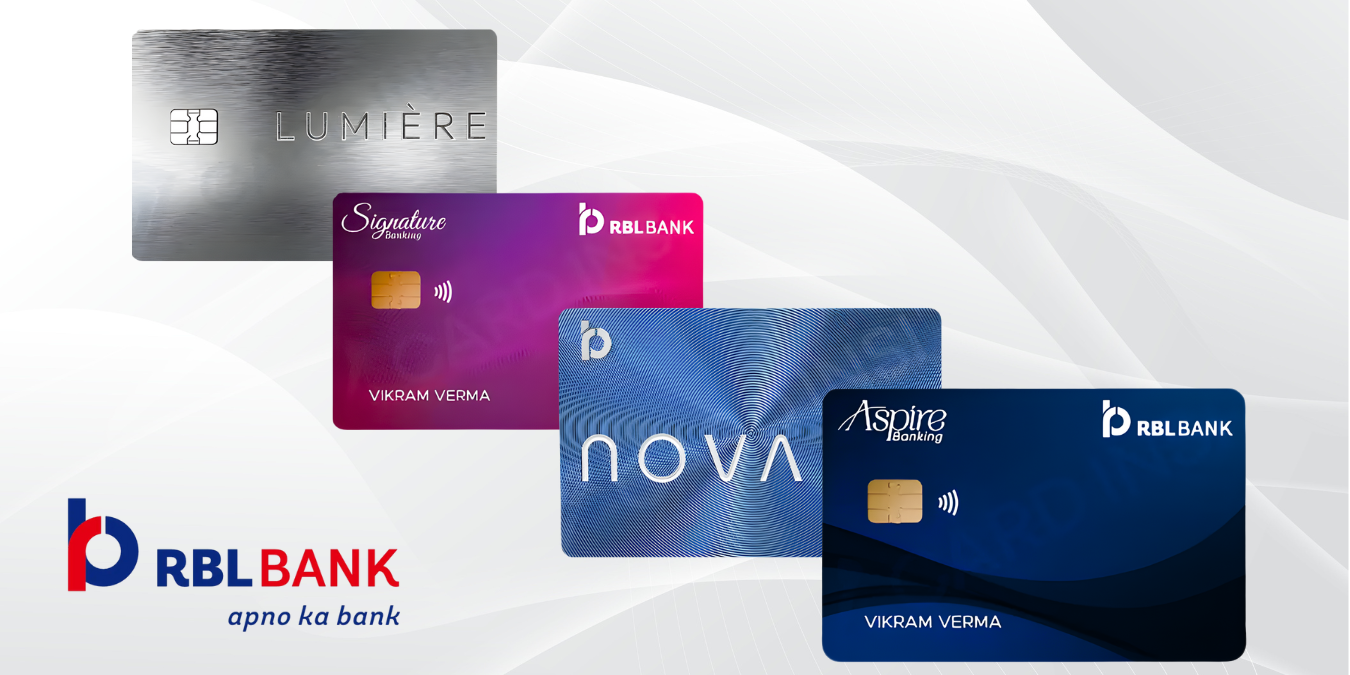
Why RBL Bank’s Four New Credit Cards Could Save You Thousands in Fees and Charges in 2025—Are You Eligible?
RBL Bank has expanded its card portfolio with four new products – Nova, Lumière, Aspire Banking, and Signature Banking – targeting everyone from relationship-banking customers to ultra-HNIs seeking metal cards and experiential luxury. These cards collectively signal RBL’s push into premium and super-premium segments while bundling value cards with Aspire/Signature banking relationships.
Overview of the Four New Cards
RBL’s new line-up is structured in a clear hierarchy: Aspire Banking as an entry relationship card, Signature Banking as a mid-tier value card, Nova as a super-premium metal card, and Lumière as an invite-only ultra-premium metal card. All four sit above RBL’s older mass-market cards and are meant to deepen engagement with affluent and emerging affluent customers.
- Lumière Credit Card – invite-only metal card with a very high fee and bespoke privileges for ultra-high-net-worth individuals.
- Nova Credit Card – super-premium metal card with high rewards on travel and lifestyle, plus strong lounge and golf benefits.
- Signature Banking Credit Card – mid-tier cashback card linked to Signature Banking relationships, with travel and entertainment benefits.
- Aspire Banking Credit Card – entry-level relationship card offering decent cashback and basic lounge and movie benefits.
Lumière Credit Card – Features, Rewards & Review
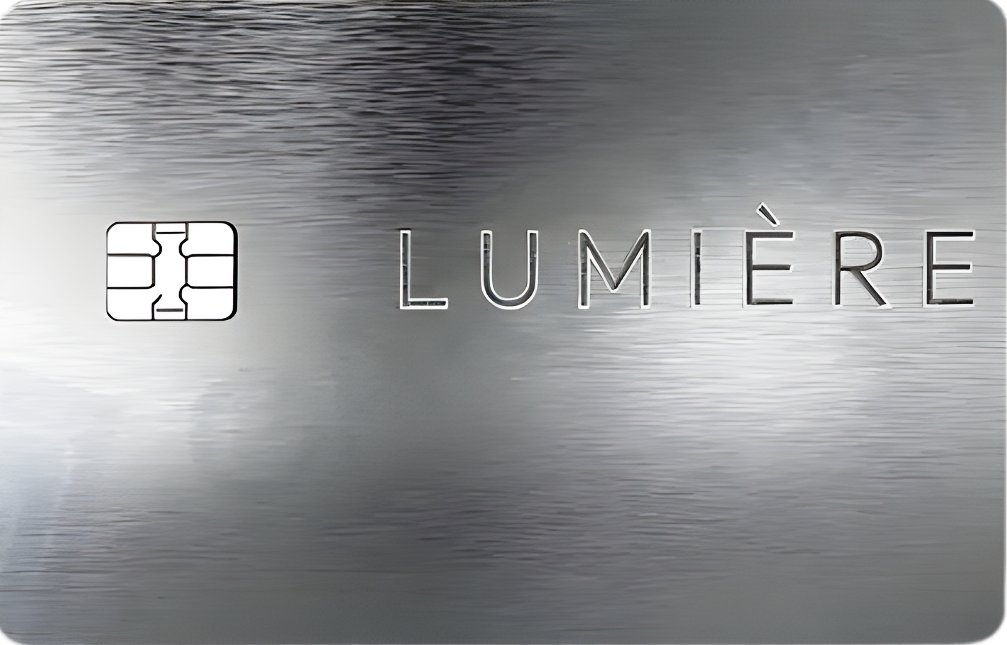
Lumière is positioned as RBL’s flagship, invite-only metal card for ultra-HNIs who value exclusivity more than raw reward-rate math.
- Type & Segment: 18-gram metal credit card, ultra-premium, invite-only.
- Joining/Annual Fee: ₹50,000 + GST per year.
- Target User: Very high spenders who want concierge-style curation, rare experiences and membership-linked privileges.
Key benefits (as publicly outlined so far):
- Curated travel & “rare experiences” – bespoke travel planning, exclusive events and partnerships, though exact partners have not been fully disclosed.
- Exclusive memberships & sustainability initiatives – access to select clubs/memberships and certain sustainability-led benefits, details still evolving.
- Metal form factor & design – 18-gram metal card positioned as a status symbol.
Review perspective: At this stage, Lumière is more about positioning and access than quantifiable returns; the very high fee only makes sense for ultra-HNIs who actively use concierge, luxury travel and exclusive memberships. For most affluent but not ultra-rich users, Nova, Signature Banking, or even other banks’ premium cards will be more rational.
Nova Credit Card – Rewards, Benefits & Review
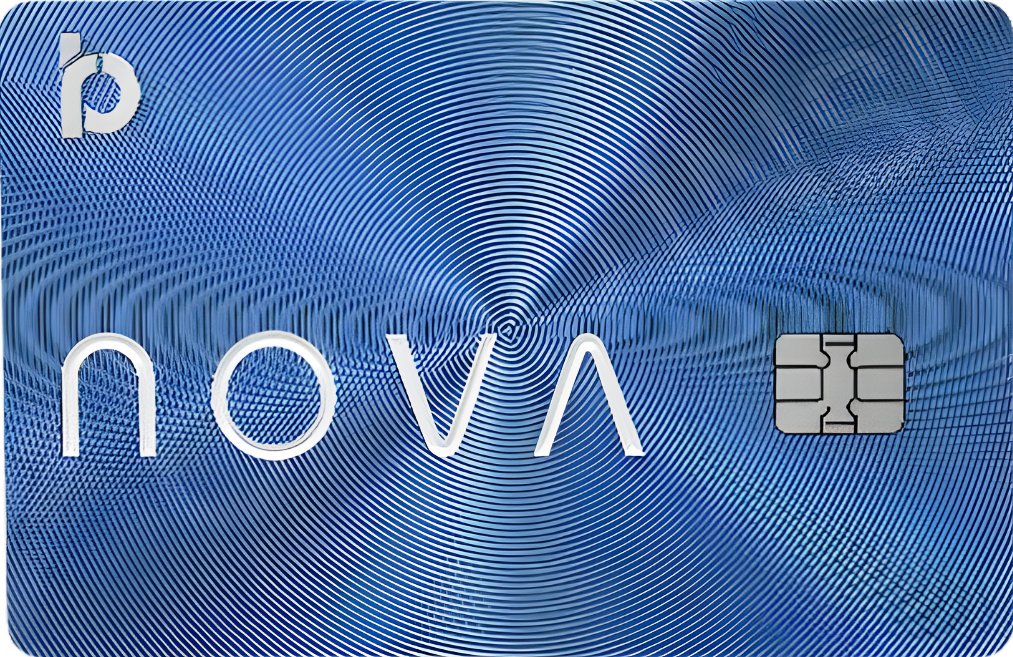
Nova is the headline-grabbing super-premium metal card, with a high fee but unusually generous rewards and benefits if optimised well.
- Type & Segment: Metal, super-premium, lifestyle and travel-focused card.
- Annual Fee: ₹12,500 + GST.
- Target User: Affluent, heavy spenders with significant travel, dining and luxury lifestyle spends.
Key reward structure (from early benefit grids and expert breakdowns):
- Base rewards: 4 reward points per ₹200 on regular retail spends, with each point effectively valued at ₹1 when redeemed, implying about 2% value-back on general spends.
- Accelerated rewards: 12 points per ₹200 on travel and gift-card spends via the bank’s portal, giving around 6% value-back on those categories.
- Quarterly milestone: Spend ₹3 lakh in a quarter to get a ₹10,000 gift card, effectively ~3.3% incremental value on those milestone-linked spends.
- Welcome benefit: Joining gift of a ₹12,500 Taj/Luxe gift card, which fully offsets the first-year fee if used.
Lifestyle and travel perks:
- Airport lounges: 12 domestic plus 12 international lounge visits annually, with up to 4 guest entries on the international side.
- Golf privileges: Around 4 complimentary rounds and 12 lessons per year at select courses.
- Dining: 10% discount at top restaurants in India through partnered dining programmes.
- Low forex mark-up: 2% cross-border mark-up, better than typical 3.5% on mass cards.
- Redemption flexibility: Reward points redeemable for luxury goods, holidays, jewellery and more; also convertible to select airline miles.
Exclusions and limits:
- No or reduced rewards on fuel, utilities, insurance, government payments, rent, wallet loads, cash, etc. (standard set of excluded MCCs; detailed T&Cs still to be finalised).
Review perspective: For heavy travel and portal-based spenders who can comfortably cross quarterly milestones, Nova’s blended reward rate can be very strong, often exceeding many competing super-premium domestic cards in pure cashback-equivalent value. However, optimising requires routing significant spending through RBL’s portal in eligible categories, and the high fee demands disciplined use of benefits.
Signature Banking Credit Card – Features, Rewards & Review
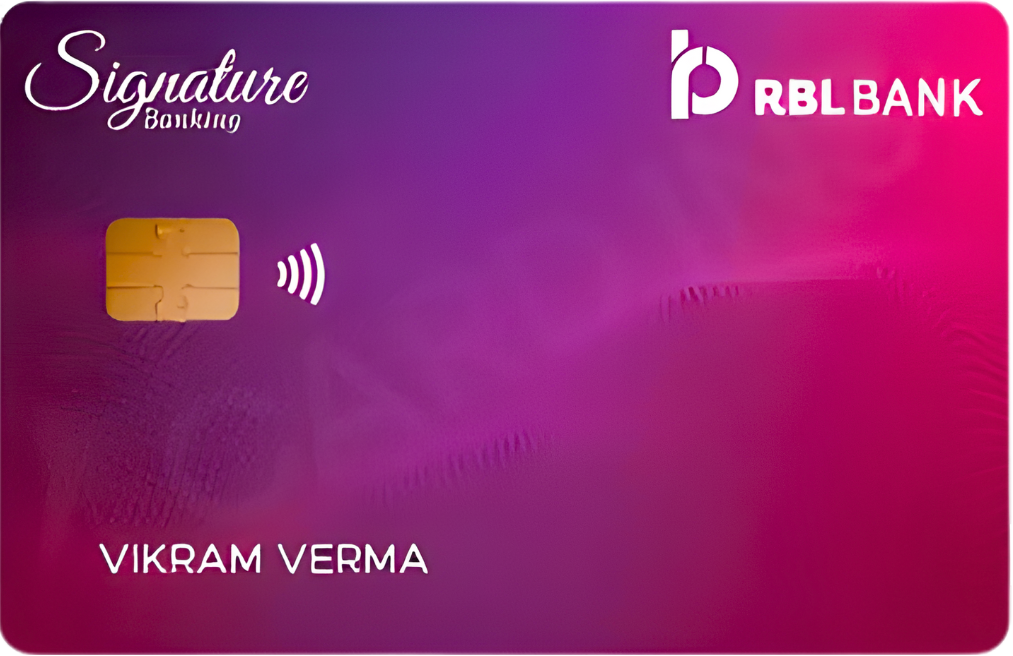
The Signature Banking Credit Card is a relationship-linked mid-tier product for Signature Banking customers, providing decent cashback and travel benefits at a moderate fee.
- Segment: Mid-range lifestyle/cashback card, linked to Signature Banking.
- Annual Fee: ₹2,500 + GST, waived for Signature Banking account holders.
Reward structure and milestones:
- Accelerated cashback: Up to 4% cashback on flights, hotels, shopping and vouchers via the RBL Rewards Portal.
- Base cashback: 1% cashback on other eligible spends, capped at ₹1,500 per billing month.
- Milestone benefits:
- ₹2,000 cashback on reaching ₹4 lakh annual spends.
- Extra ₹4,000 cashback at ₹6 lakh spends in a membership year.
Travel and lifestyle perks:
- Lounge access: 2 domestic lounge visits per quarter and 2 international visits per year via Priority Pass.
- Movies: BookMyShow Buy 1 Get 1 Free once a month, up to ₹250 per month.
Limitations:
- Cashback not applicable on several essential categories like grocery, dining, entertainment, fuel, utilities, insurance, railways, rentals, education, wallets, government and cash-related spends.
Review perspective: For Signature Banking clients who get the fee waived, the card can be attractive as a secondary travel and portal-shopping card, but the long list of excluded categories weakens its utility as a “daily driver”. For non-relationship users who must pay the fee, competing mid-tier cards from other issuers may offer broader category coverage.
Aspire Banking Credit Card – Features, Rewards & Review
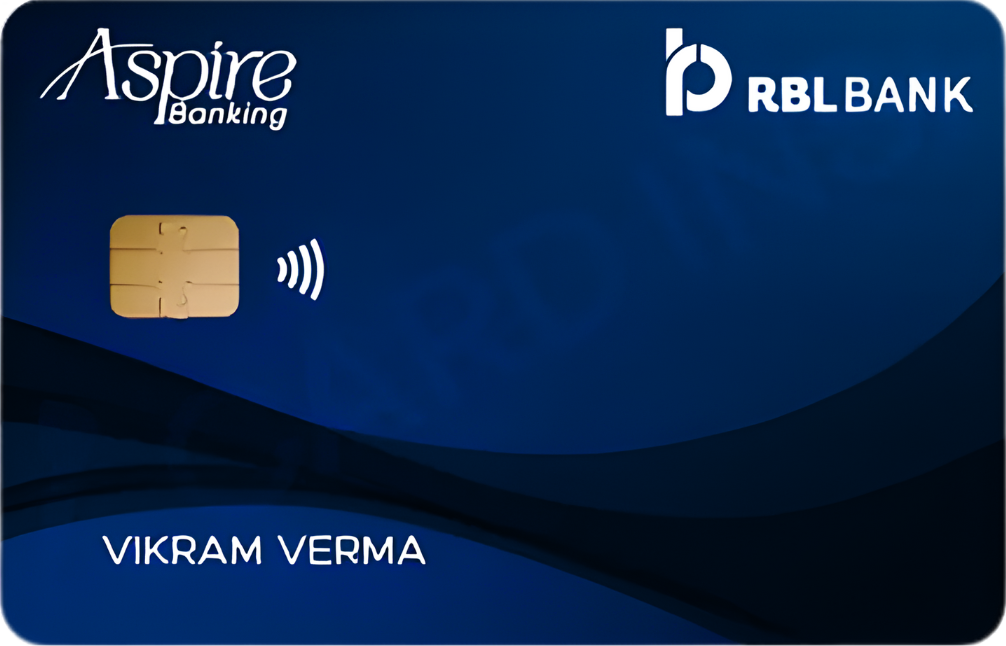
Aspire Banking Credit Card is the entry-level relationship card designed for Aspire Banking customers, focusing on simple cashback and occasional lifestyle perks.
- Segment: Entry/mid-level value card linked to Aspire Banking.
- Annual Fee: ₹1,500 + GST, waived for Aspire Banking account holders.
Rewards and milestones:
- Accelerated cashback: 3% cashback on flights, hotels, shopping and vouchers through the RBL Rewards Portal.
- Base cashback: 1% cashback on all other eligible spends up to ₹1,000 per billing month.
- Milestones:
- ₹1,500 cashback at ₹3 lakh annual spends.
- Extra ₹3,000 cashback upon hitting ₹5 lakh spends.
Lifestyle benefits:
- Domestic lounges: 1 complimentary domestic lounge visit per quarter, linked to a minimum quarterly spend of ₹35,000.
- Movies: BookMyShow Buy 1 Get 1 Free monthly, up to ₹150.
Review perspective: As a bundled card with fee waiver for Aspire Banking users, it works as a simple, portal-centric cashback product with occasional lounge and movie perks. However, standalone, its value is modest compared with aggressive entry-level cards from bigger issuers, particularly given the reliance on the bank’s portal for higher rewards.
Fees and Charges Summary
Key fee points across the four cards:
- Lumière – ₹50,000 + GST annual fee, invite-only, no standard waiver path disclosed.
- Nova – ₹12,500 + GST annual membership fee.
- Signature Banking – ₹2,500 + GST, waived if you hold a Signature Banking account.
- Aspire Banking – ₹1,500 + GST, waived for Aspire Banking customers.
Other charges such as interest rate, late payment fees and over-limit charges will follow RBL’s standard grid and will be detailed in final MITC documents; forex mark-up on Nova is currently set at 2%, while for others it is expected to be closer to mainstream levels until specified otherwise.
Pros and Cons of the New Line-up
Key Pros
- Clear laddering from relationship to super-premium – Aspire and Signature pair with banking relationships; Nova and Lumière address affluent and ultra-affluent needs.
- High reward potential on Nova – Up to 6% on portal travel/gift-card spends plus strong milestone benefits, which is very competitive in the super-premium space.
- Rich travel and lifestyle perks – Nova and Lumière in particular offer strong lounge, golf and experiential privileges; Signature adds reasonable lounge access for mid-tier users.
- Fee waivers for relationship customers – Aspire and Signature Banking card fees are waived for respective account holders, improving value.
- Metal positioning for brand image – Nova and Lumière metal designs should appeal to status-conscious users and help RBL stand out.
Key Cons
- Very high fees at the top end – ₹12,500 and ₹50,000 annual fees demand very high, optimised spending plus heavy use of non-monetary privileges.
- Heavy dependence on RBL portal categories – Best reward rates on Nova, Signature and Aspire are tied to portal-based spends, which may not suit users who prefer direct merchant/OTA bookings.
- Significant excluded categories – Everyday spends such as groceries, utilities, fuel and insurance are largely excluded from higher cashback on Signature and Aspire, reducing effective return for typical salaried users.
- Incomplete public details for Lumière – Many benefits are still vaguely described as “rare experiences” and “exclusive memberships”, making it hard to quantify value vs fee.
- RBL brand perception risk – Some users might hesitate to route large premium-card spending through a smaller private bank versus bigger incumbents, especially if they already hold a flagship card from those issuers.
Who Should Choose Which Card?
Lumière Credit Card
- Suitable for: Ultra-HNIs already using concierge-led premium programmes who value brand, exclusivity and curated experiences more than raw cashback.
- Avoid if: You are primarily looking for numerical reward optimisation or if your annual card spends are not extremely high; the ₹50,000 fee is hard to justify otherwise.
Nova Credit Card
- Suitable for: Affluent users spending heavily on travel, premium lifestyle and who are comfortable booking via RBL’s travel/gift-card portals, and can hit quarterly milestones of ₹3 lakh.
- Avoid if: Your spends are fragmented across many small categories like groceries and utilities, or you rarely travel or use lounges/golf benefits.
Signature Banking Credit Card
- Suitable for: Existing or prospective Signature Banking customers wanting a bundled card with lounge, portal cashback and some milestone benefits, especially when the fee is waived.
- Avoid if: You are not part of Signature Banking or want a simple everyday card covering groceries, fuel, utilities and bill payments; many mid-tier competitors reward those categories better.
Aspire Banking Credit Card
- Suitable for: Aspire Banking customers who want a basic but bundled card for some travel/shopping via the portal and occasional lounge/movie perks, with fee waiver.
- Avoid if: You are a non-Aspire user paying the fee or if your primary need is high-value rewards on routine spends (fuel, groceries, bills), where other entry-level cards may be superior.
Overall Recommendation
From a value-maximisation lens, Nova appears to be the most compelling of the four for high-spend, travel-heavy users who can exploit its portal-based 6% categories, milestone gift cards, and strong lounge/golf benefits. Signature and Aspire Banking cards make sense primarily as relationship freebies for respective banking customers, not as standalone flagship products. Lumière, meanwhile, is best viewed as a niche, invitation-based status product whose worth will depend on how much one uses its opaque but potentially powerful experiential and membership privileges.



























